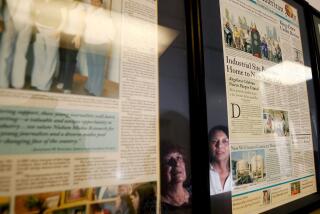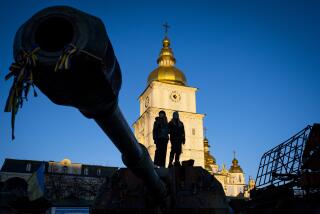Media : Fiery Soviet Magazine Flies Free of Party Ties : The staff takes over and struggles to find freedom of the press.
MOSCOW — Vitaly A. Korotich, editor-in-chief of Ogonyok, couldn’t hide his delight. Flanked by two subordinates, he scanned freshly prepared proofs of the muckraking weekly’s next expose, certain to raise that thunderclap of controversy the Russians call skandal.
“Look at this!” he exclaimed to a visitor. Spread out on the table in Korotich’s fifth-floor office were pre-production page proofs recounting how a half-dozen dangerous racketeers escaped from custody after bribing Interior Ministry guards who earn the paltry equivalent of $12.50 a month.
The story, being given a last read for errors before going to press, was quintessential Ogonyok: corruption and official malfeasance laid bare. That brand of hard-hitting, anti-establishment journalism has made the magazine and its chief, a poet from the Ukraine, one of the country’s most respected--and simultaneously one of its most loathed--institutions.
Now, the publication that is both the “Life” and the “Mother Jones” of Mikhail S. Gorbachev’s Soviet Union has embarked on a new phase: Ogonyok has gone private. Under a new Law on the Press, which ended official censorship of the printed media, the 100-member staff took $24,000 from its collective pocket and legally took over the slick weekly.
In theory, that pioneering move terminates Communist Party control over Ogonyok. It makes the 67-year-old magazine, whose name means “Little Fire,” the first official Soviet publication with a national reach to go independent.
But in reality, Korotich and his hard-working, modestly paid staff are discovering the hard truth of U.S. press critic A. J. Liebling’s observation that freedom of the press exists only for the man who owns one--even under socialism.
The owner of the printing press, in Ogonyok’s case, remains the Communist Party, or more exactly, the Pravda Publishing House, which is run by the party’s Central Committee. Despite its newly proclaimed independence, Ogonyok still occupies fourth- and fifth-floor offices in a northwest Moscow building belonging to the party--there’s even a “Pravda” sign on the roof--and is typeset and printed by party-owned collectives.
Then there are the government and party bureaucrats--Ogonyok’s preferred targets since Korotich took over what had been a bland, docile journal in June, 1986, and transformed it into one of the radical fire-eaters of glasnost. Despite favorable talk about the “free market” now emanating from the Kremlin, Korotich claims that what officials are trying to do to his magazine “is not Adam Smith, but Al Capone.”
For example, Korotich recently got a phone call informing him that government functionaries had decided that a mail subscription to Ogonyok would cost 51 rubles yearly, or $88. That may seem a modest sum, but it is 2 1/2 times the current price and a week’s pay for a Soviet factory worker.
Korotich says officialdom, which has failed to silence him, may now want to price him out of business. “It’s banditry,” he exclaims. “Raising our price to a ruble a week is like charging $3 for a copy of the Los Angeles Times. For that amount of money, none of our democratically oriented readers can afford to buy us.”
Why Communist Party bookkeepers would want to continue to milk Ogonyok seems a pure matter of economics: at 4.5 million copies published weekly, up from pre-Korotich subscription sales of 260,000, it’s a moneymaker at a time when readership of orthodox journals like Pravda has dropped.
“Every year, Pravda loses 500,000 rubles ($862,000) and receives an enormous subsidy,” Korotich said. “From our profits, they pay their staff of 500. They’re living off us, not off the sales of Pravda: Their salary is two, three times higher than my staff’s, and they’ve got so many people they’re roaming the halls over there not knowing what to do.”
In contrast, the average Ogonyok journalist until now has been paid about 200 rubles a month, or $345, less that what many Soviet industrial workers get.
One Moscow-based newspaper estimates that Ogonyok has brought the party a yearly profit of about 70 million rubles, or $120 million, and Korotich says that’s not far off. “All of it goes into the party’s deep purse,” he says. “They tell us, ‘You’re free, but the subscription price is 51 rubles. You’re free, but you have to print in our plant,”’ Korotich complains. “We’re hostages of the system.”
True to form, Ogonyok and its allies are fighting back. Progressive Moscow Mayor Gavriil Popov has offered it a building, and Korotich said he and his colleagues could be out of the Pravda Publishing House in the newspaper district in a year and a half.
Korotich has also been in touch with foreign firms such as Time-Life and Reader’s Digest to talk about getting Ogonyok printed elsewhere. He’s also battling the Soviet practice of letting government bureaucrats allocate newsprint, inexplicably a scarce commodity in the country with more forests than any other.
Ogonyok earns about $1.7 million yearly through government-organized sales of 200,000 weekly issues abroad, and Korotich wants to get that money back from the state and use it to buy paper.
If Ogonyok can break free of the bureaucrats’ grip, it could be a huge financial success, even taking into account the costs of independence. Korotich is proposing more modest price increases--to 39 rubles annually ($67) for a subscription, and from 40 kopecks to 70 kopecks (or about $1.20) an issue at the newsstand.
More to Read
Sign up for Essential California
The most important California stories and recommendations in your inbox every morning.
You may occasionally receive promotional content from the Los Angeles Times.










